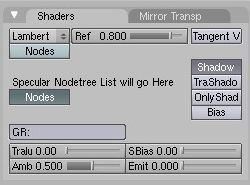Dev:Source/Node Editor/Materials
目次
Introduction
The goal of this project is to add custom shaders to materials, be they traditional or node-based. These shaders would be made with the node system.
Current Plans
These are the things that I currently plan on implementing. As ideas are added, dropped, or finished, they'll be moved around to different sections, or removed.
Pick a Prefix
The name 'Shader' is currently being used by the Material nodes. I need to come up with a prefix to use for my shaders in the code. I'm thinking 'Lighting' , so the file would be node_lighting.c and the functions, data types, etc. would have 'LG' as the prefix.
Retro-fitting Current Shader System
New fields will be added to the Material structure, to check if either the diffuse or specular shaders are using node trees, or the original shaders. If node trees are being used, a drop-down list of all the diffuse- or specular-node-trees will replace the list of in-built shaders.
The lighting loop can check for these values before calling the original shaders. If it finds that a node-tree is being used, it calls the node tree, instead of the shader that is defined with the original hard-coded ID number.
Lighting tie-in
The lighting system currently calculates a single diffuse value for the color, and then passes this value on to the function that adds the diffuse color. This function then multiplies the diffuse color by this value. The same goes for specular values.
The node-shaders can either keep with this two-output method, or have a default '1' value for the diffuse value, with the actual diffuse value having been already multiplied in the shader itself.
The first method allows for much easier tie-in to the rest of the shader system, though it may be slightly confusing to those just learning the system. The second method would require a goodly amount of work done to the rendering system, but will result in a system that other new methods can easily tie into. (GLSL, for example...).
The second method is what I'd like to do, but the coding may be beyond my understanding. If it's not, I'll certainly do it. If it is, I'll settle for the first method.
Shader Nodes
This is the current list of nodes that will be implemented in the low-level shader tree. This list will probably vary, especially the input and output nodes, but for they give a general idea. Descriptions of the nodes can be found here.
Inputs
- Material
- Alpha
- Color
- Geometry
- Normal Vector
- View Vector
- Light
- Light Color
- Light Vector
- Light Intensity
Generators
- Color
- Scalar
- Vector
Outputs
- Color
- Alpha
Vector Ops
- Curve Mapping
- Math
- Dot Product
- Cross Product
- Addition
- Subtraction
- Multiplication (component-wise)
- Division (component-wise)
Color Ops
- Curve Mapping
- Mix (just like the mix node in the Material node trees)
Value Ops
- Curve Mapping
- Math
- Addition
- Subtraction
- Multiplication
- Division
Special
- Shadow
Material Nodes
Two new nodes will be added to the MatNode system: Diffuse and Specular. The Diffuse node provides direct access to a diffuse shader, without using a complete Material Node. The Specular node does the same for a specular shader. These nodes can access either Blender's built-in shaders, or custom nTree-based shaders.
Custom Shader Input/Output nodes
Nodes that allow for an unlimited number of I/O options for shader nodes. The Diffuse and Specular nodes in the MatNode system will need to be written in a way that allows for a variable number of inputs and outputs. This might require some re-writing of the node system. I'll look at how node groups create variable inputs/outputs, and move on from there.
Other Things I'd Like To Do
These are things that are totally at the "This Would be Really Neat" stage. This area can be used as a discussion area, as well. If you have any ideas, or comments on ideas in here, go ahead and post them.
GLSL shaders
Using GLSL shaders in the render path, with the shader Node Tree being parsed to create a GLSL shader. The shaders could also be used in the Game Engine, or anywhere else, really.
PY Nodes
These have been mentioned elsewhere. Creating Nodes that point to a Python Script, to be added anywhere one pleases.
Progress
This area shows the progress of all the different coding things that need to be worked on. It will be updated as things are added, removed, or what have you.
- in progressAdd support in render system for Node Shaders
 25%
25%- Have started moving stuff from inline code to functions
- This is mostly for readability
- Should be able to tie node tree in very easily
- Have started moving stuff from inline code to functions
- in progressAdd GUI support for Node Shaders
 25%
25%- Have begun adding Node Shader options to Material panel
- in progressCode all nodes for Node Shader system
 50%
50%- A few nodes have been coded, and the nTree exec func has been started
- to doAdd Diffuse and Specular nodes to Material Nodes
- to doAdd variable-input and variable-output support to node system
Media
Huzzah for screenshots! Any showing-off of what's done will go here.
 These are the new buttons to allow selection of nodes instead of built-in shaders.
These are the new buttons to allow selection of nodes instead of built-in shaders.
--Branan riley 00:36, 21 July 2006 (CEST)